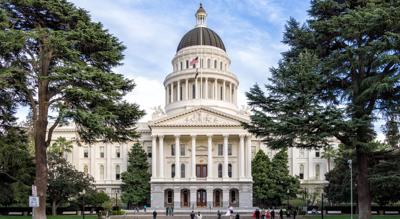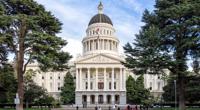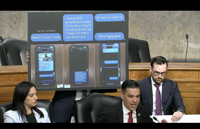
Sacramento, View of California State Capitol from 10th Street. (Andre M/Wikimedia Commons)
Governor Gavin Newsom has put his stamp of approval on hundreds of bills sent to him by the state legislature, but he still has a few days to either approve or veto the dozens of bills left.
Many of the bills Newsom has so far signed deal with education, housing, health care and immigration; they have gone through the arduous process of being passed by both the state Assembly and Senate. The deadline for the governor to decide on the bills left is Oct. 12.
“All Californians deserve an affordable place to live — close to jobs, schools and opportunity,” said Newsom in a press release announcing his signing of Senate Bill 79, a bill that allows new housing to be built in high-density areas. He added, “When we invest in housing, we’re investing in people — their chance to build a future, raise a family, and be part of a community.”
SB 79, introduced by Sen. Scott Wiener (D-San Francisco), was one of the most anticipated bills on Newsom’s desk. With its passage, the bill will allow apartment developers to build new buildings as tall as nine-stories high within a half mile of major transit stops.
The bill received significant pushback from many city councils throughout the state since it overrides many local zoning restrictions and possible objections by nearby residents.
“SB 79 is a historic step toward tackling the root cause of California’s affordability crisis — our profound shortage of homes and too few people having access to transit,” said Wiener in the news release, adding, “in California, we talk a lot about where we don’t want to build homes, but rarely about where we do — until now.”
As part of housing reform, Newsom also signed the following bills:
AB 920 by Assemblymember Jessica Caloza (D-Los Angeles). Required cities and counties with over 150,000 people to create online housing portals to track housing development project applications by Jan. 1, 2028;
AB 1007 by Assemblymember Blanca Rubio (D-West Covina). Shortens the timeline for agencies to approve or deny residential and mixed-use development projects; and
SB 21 by Senator María Elena Durazo (D-Los Angeles). Modifies requirements for the demolition and replacement of single-room occupancy units and provides protection for displaced residents.
On Oct. 1, Newsom announced he had signed AB 1362, legislation that provides protections to agricultural workers on H-2A visas from wage theft, labor violations and human trafficking. The long-term goal is to extend the protections under the bill to all visa categories.
Under the bill, recruiters will be required to provide contracts in a worker's native language and disclose all terms and conditions. They are also forbidden from charging illegal recruitment fees.
“As the federal government continues to roll back worker protections and engage in rampant attacks against our immigrant communities, I am thankful California will extend commonsense safeguards to thousands of farmworkers, preventing human trafficking and exploitation,” said bill author and Assemblymember Ash Kalra (D–San José) in a news release.
Newsom also gave his stamp of approval to SB 635, the Street Vendor Protection Act, authored by Sen. María Elena Durazo (D-Los Angeles). The bill will protect the personal information of street vendors who are immigrants by forbidding local authorities from sharing the information with immigration enforcement agencies without a warrant or subpoena.
When reviewing permit applications, local government agencies will not be allowed to inquire about immigration or citizenship status or collect fingerprints or criminal history.
Durazo and a group of immigrant rights and economic justice organizations came together last week in Boyle Heights to urge Newsom to sign the bill and support street vendors.
On Wednesday, Newsom marked Latina Equal Pay Day by signing SB 642, the Pay Equity Enforcement Act. Authored by Sen. Monique Limón (D-Santa Barbara), the bill aims at narrowing the ongoing wage gap.
A recent report from the Justice for Migrant Women showed Latinas earn 54 cents for every dollar earned by white, non-Hispanic men. This is one of the widest wage gaps of any demographic.
SB 642 strengthens the existing California Equal Pay Act by allowing workers to recoup lost pay, revising binary language as it relates to gender and provides limits on how wide pay ranges can be in public job postings.
“The Pay Equity Enforcement Act will help narrow the wage gap by providing workers with more negotiation power at the start of their career, while also strengthening workers’ rights to recover lost wages – this is a win for workers and an even bigger win for California families,” said Limón.
Newsom also signed AB 715, a controversial bill aimed at combating antisemitism in schools. Authored by Assemblymember Rick Chavez Zbur (D-Los Angeles) and Assemblymember Dawn Addis (D-San Luis Obispo), the bill will create a state Office for Civil Rights that includes an antisemitism prevention coordinator and creates processes that monitor and root out curriculum the Office deems discriminatory.
“Every student deserves to be safe, valued and respected — no matter who they are or what they believe,” said Chavez Zbur in a news release, adding, “at a time when hate is rising and antisemitism is sweeping our communities, AB 715 reaffirms California’s commitment to inclusion and standing up against bigotry in all its forms.”
Antisemitism-specific education will be developed by the coordinator and provided to teachers and school boards. Opponents of the bill say it infringes on free speech and will censor what educators are able to teach.
“(The bill) will censor educators’ ability to engage students in discussions of relevant global history and in so doing, undermine genuine understandings of antisemitism. This will unnecessarily politicize the educational process,” reads a statement from the California Faculty Association, a group that strongly opposed AB 715.
Among the dozens of bills Newsom has so far vetoed are:
AB 682 by Assemblymember Liz Ortega (D-San Leandro). Would have required health plans and insurers to publish certain prior authorization data on their website and report it to the state;
AB 689 by Assemblymember Blanca Rubio (D-Baldwin Park). Would have established a statewide Child Welfare Disaster Response Fund and program to support foster youth and their caregivers during disasters; and
SB 613 by Senator Henry Stern (D–Los Angeles). Would have required the California Public Utilities Commission, among other state agencies, to prioritize strategies to reduce methane emissions.
Newsom has until Sunday, Oct. 12 to finish going through bills.











(0) comments
Welcome to the discussion.
Log In
Keep it Clean. Please avoid obscene, vulgar, lewd, racist or sexually-oriented language.
PLEASE TURN OFF YOUR CAPS LOCK.
Don't Threaten. Threats of harming another person will not be tolerated.
Be Truthful. Don't knowingly lie about anyone or anything.
Be Nice. No racism, sexism or any sort of -ism that is degrading to another person.
Be Proactive. Use the 'Report' link on each comment to let us know of abusive posts.
Share with Us. We'd love to hear eyewitness accounts, the history behind an article.